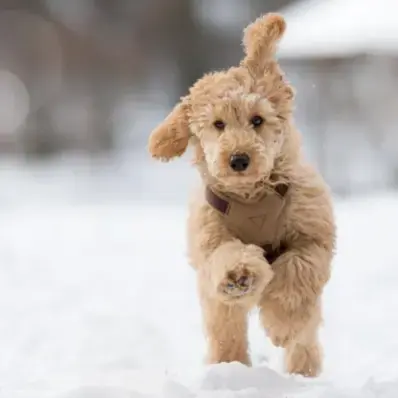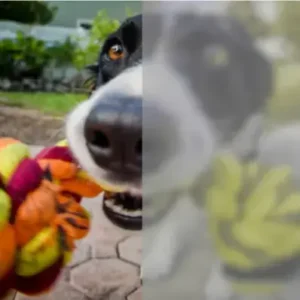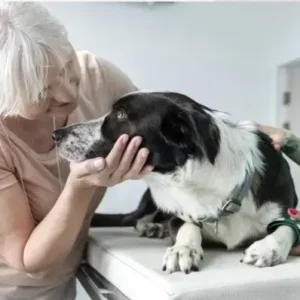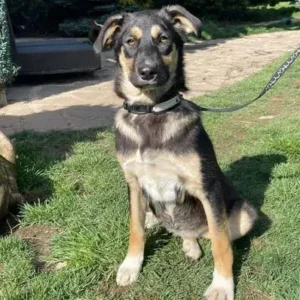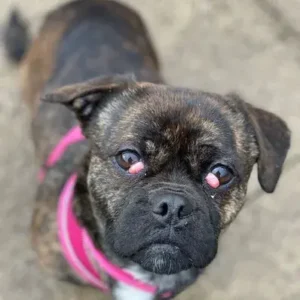Common Causes of Dog Hiccups
There are several reasons why a dog might experience hiccups, and understanding these can help you manage the situation:
- Eating or Drinking Too Quickly: Dogs that gulp their food or water too fast can swallow air, which may lead to hiccups. This is particularly common when a dog is very hungry or excited.
- Excitement or Stress: High energy levels, excitement, or anxiety can trigger hiccups. This could happen during playtime, car rides, or encounters with new people or animals.
- Cold Air or Sudden Temperature Changes: Hiccups may also occur when a dog experiences a sudden temperature change. This can happen after going outside in cold weather. Drinking very cold water can also trigger hiccups in some dogs.
- Exercise and Activity: After intense physical activity, dogs may get hiccups due to exertion, just like humans. Incorporating dog training tips like positive reinforcement can help maintain their well-being.
- Puppies and Hiccups: Puppies, especially younger ones, seem to experience hiccups more often. Their bodies are still developing, and hiccups are part of their natural growth process.
- Brachycephalic breeds: Dog breeds with short noses and flat faces, like Bulldog, Pugs, and French Bulldog, may be more prone to hiccups because their breathing can be affected by their short airways.
- Gas or Upset Stomach: One theory is that hiccups are your puppy’s way of relieving gas or soothing an upset stomach.
Are Dog Hiccups Dangerous?
In most cases, dog hiccups are completely harmless and don’t indicate any underlying health issues. They are usually short-lived and resolve on their own. However, there are some exceptions:
- If your dog’s hiccups last more than an hour or are accompanied by vomiting, gagging, or a change in their breathing pattern, it could indicate a serious issue. Contact a veterinarian if this happens.
- Hiccups combined with lethargy, lack of appetite, or unusual behavior could point to gastrointestinal or respiratory problems that need veterinary attention.
Can Puppies Get Hiccups?
Yes, hiccups are common in puppies. Just like adult dogs, puppies may experience hiccups for several reasons, such as excitement, eating too quickly, or the natural development of their digestive systems. Because puppies are still growing, their bodies are more prone to hiccups as they adjust to new experiences.
In most cases, puppy hiccups are harmless and will go away on their own. Additionally, following a puppy vaccine schedule is essential to ensure your puppy stays protected against common diseases.
However, if your puppy’s hiccups are persistent or come with other concerning symptoms, it’s best to consult a veterinarian.
How to Get Rid of Dog Hiccups
While most hiccups will go away on their own, you can try a few methods to help calm your dog:
- Gently encourage your dog to take a short walk to distract them and possibly stop the hiccup cycle.
- Offer small amounts of water to help soothe the diaphragm and hydrate your dog.
- Calm your dog: If excitement or stress is the cause, help your dog relax by creating a calm and quiet environment.
- Massage your dog’s chest or belly gently: This may help relieve the spasm and reduce the hiccups.
- If your dog is eating or drinking, either remove the dog bowl or take them away from the food or water. You can also try offering smaller portions to help prevent hiccups.
Prevention Tips for Dog Hiccups
While you can’t always prevent hiccups from happening, there are a few strategies to reduce their frequency:
- Feed smaller meals more frequently: Instead of one large meal, try giving your dog smaller, more frequent meals to prevent gulping and swallowing air.
- Use slow feeders: Special bowls designed to slow down eating can help your dog take their time while eating, reducing the likelihood of hiccups.
- Keep your dog calm: If excitement triggers hiccups, try to maintain a calm and relaxed environment, especially during high-energy activities.
- Avoid sudden temperature changes: Gradually adjust to colder or hotter environments, and be mindful of how your dog reacts to temperature shifts.
When to See a Vet
In rare cases, hiccups can be a symptom of a more serious condition. If you notice any of the following signs, it’s time to consult your veterinarian:
- Persistent hiccups lasting over an hour or recurring frequently.
- Hiccups and vomiting, coughing, gagging, or difficulty breathing.
- Your dog appears distressed, lethargic, or refuses to eat or drink.
- Changes in your dog’s behavior or appetite alongside hiccups.
A veterinarian will be able to assess your dog’s health and determine if there is an underlying medical issue that needs to be addressed.
Hiccups include a series of sudden and involuntary diaphragm contractions. If your dog has hiccups while sleeping, it’s likely due to relaxed muscles and should resolve on its own without intervention.
However, if your dog experiences persistent hiccups or shows signs of illness, it’s always best to seek professional veterinary advice.

